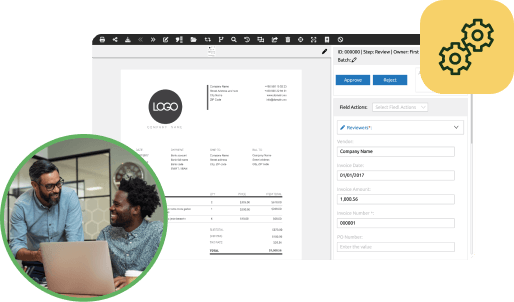
PairSoft
The strongest AP automation, document management, procurement, and fundraising automation platform for mid-market and enterprise companies with integrations to your ERP system.
View all posts by PairSoftPairSoft

Some have turned to outsourcing a bulk of their invoice data entry processes during this journey to cut down on costs and turnaround time. Although some companies turn to local data entry services, others have been swayed by the low costs dangled in front of them by offshore data entry operations.
No matter which of these paths you lean toward, both have some challenges if the real goal is data entry automation. Outsourcing can bring a whole host of other costs and time to ramp up your vendor, test connectivity, and configure a secure data transmission connection to ensure you securely receive your data.
Many of these services rely on a room full of manual data entry operators. And while their managers may train them, they’re still comprised of humans using eyes and keyboard strokes to enter your accounting data as fast as possible.
With the added pressure of performance goals and handling a whole spectrum of other clients, it’s a combination that leans more toward the number of transactions over data quality.
And just about everyone has realized that getting the quality results you need while using reliable offshore data entry teams is not as easy as it sounds.
What organizations really want is to automate and lower the time spent around invoice processing as a whole. This can be automated using the right technology. Technology that is already in place and delivering results as we speak.
This isn’t the legacy OCR technology that needs zones or boxes to lasso data from a page. Technology, such as PairSoft, put’s the power of Smart Document Recognition (SDR) to work for your AP transactions by leveraging cutting-edge artificial intelligence.
And, because this technology can actually tap into your existing ERP system for verification, you see automation rates outsourcing and other technologies just can’t touch.
This delivers the results companies have been striving for when reviewing their internal AP transaction workloads, such as decreasing transaction times and lowering manual entry mistakes while completing more transactions with the same staff in place.
When it comes to reaching these operational goals, take a look at proven technology that’s already working for organizations leading the path toward operational efficiency.
Get a free demo to learn how our tailored workflows have boosted the AP performance for organizations of all sizes.


Many organizations start with manual receipt handling, fragmented card feeds and slow AP processes. Implement AI agents to auto-capture receipts, route approvals, enable punch-out buys and post to the ERP.
Result: faster batching, fewer errors and cost savings. “This saves us hours every month.”
Many organizations face slow, paper-heavy AP and fragmented procurement that waste time and inflate costs. AI Agents can automate approvals, PO matching and record sync to improve speed, accuracy and control. Client quote: “It freed up hours and made our process reliable.”
Operational drag and rising costs slow growth: teams waste time on manual tasks, misaligned priorities and opaque processes. AI Agents help automate routine work and coordinate actions across teams. “We’ve lost time to repeats and handoffs,” says a typical client.
Companies struggle with manual procurement, fragmented approvals, and costly integrations that slow growth and obscure spend. Our AI Agents streamline requisitions, POs, and invoice matching to cut manual work and improve visibility. “We were wasting time and missing insights,” says a client.

Many teams start with fragmented PO/AP systems, manual matching and delayed financial reporting. Deploying AI agents to automate PO checks, real-time encumbrance tracking and invoice matching reduces processing time and errors, delivering live budgets and faster closes. “Finally, we can see current balances and approve instantly.”
Many companies juggle growing invoice volumes and legacy systems. They struggle with manual processes, compliance gaps and limited headcount. Our AI Agents automate integrations, enforce rules and surface exceptions. The typical outcome: faster closes and measurable ROI. “We stopped chasing invoices.”